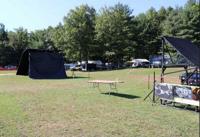DURHAM — A state Supreme Court judge has ruled that the Durham Town Board and Blackthorne Resort acted improperly when the board allowed the resort to build two bathhouses and a dump station on the site of a recreational vehicle park.
In a decision handed down Tuesday, acting Justice Adam W. Silverman determined that segmentation, meaning dividing various stages or activities of a project as though they were independent and unrelated, was inappropriate under state environmental review procedures, and could not be permitted in this case.
Silverman ruled that the RV park construction represents the complete project while the bathhouses and dump station are separate and distinct parts of the overall project and the town’s site plan was vacated.
Though Silverman, a judge for the New York State Court of Claims, vacated the actions of the town and resort, the bathhouses and dump station were built and Silverman did not order them to be dismantled and removed. Thus, the next step is up to the town board.
“The town is going to have to look at this again,” said Albany attorney Conor Brownell, who represents the plaintiffs. “Since the court didn’t force them to take the structures down, the town has to decide what to do. At the bare minimum, the town should have to prevent the Blackthorne from using them.”
A lawsuit filed last Oct. 14 in New York State Supreme Court for Greene County alleged the town of Durham allowed Blackthorne to illegally expand its RV park. The bathhouses and dump station had not been constructed at that time. Over four months of filing briefs and another 11 months awaiting the court’s decision, the structures were completed.
Over that time, clear cutting began on the site, and counsel for the plaintiffs applied for a temporary restraining order to stop it, but the judge in this instance did not see any irreparable harm to the environment and denied the injunction.
Papers were filed by Albany attorney Conor Brownell of Lippes Mathias on behalf of plaintiffs Michal M. Peczek, Anais Merle, Kevin Lillis, Patricia Schiller, Michael Lillis and Thomas Lillis. The site of one of the bathhouses is located adjacent to Peczek’s property
Cited as defendants were the town of Durham, Blackthorne Corporation, Dale Handel, Roy Handel and the New York State Department of Health.
The lawsuit aimed to reverse the town board’s decisions in August and September 2021 that approved Blackthorne’s request to build the bathhouses and a dump station intended to serve the proposed and existing RV sites at the park.
The town asserted in its argument that Blackthorne was obligated to build the bathhouses and dump station under a 2018 stipulation and order agreed on to resolve a Department of Health enforcement proceeding. Under the consent order, Blackthorne was obligated to correct a violation. This is an act of prosecutorial discretion and as such is exempt from the environmental review process.
Dale and Roy Handel and Greene County Legislator Patricia Handel co-own Blackthorne. Messages left for them seeking comment were not immediately returned.
Silverman granted the state Department of Health’s motion to dismiss the lawsuit’s allegations against it. Blackthorne sent schematics of the bathhouses to the Department of Health, but since its decision was technical in nature and did not impact the environmental review, the judge issued a dismissal.
The plaintiffs have not filed an appeal in the case, said Brownell, adding that as far as he knows, the defendants have not appealed.
Blackthorne Corporation proposed in spring 2021 to add 30 new campsites to its property. Three public hearings were held where residents voiced concern that existing RV sites were not approved. Michael Lillis told the town board at one of the hearings he worried about RV park guests driving their all-terrain vehicles on his property.
In May 2021 the Durham Town Board inked an agreement allowing Blackthorne to temporarily use the campground sites that had not been approved by the town.











